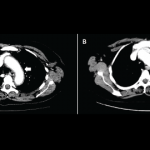She notes rheumatologists are trained to be highly attuned to patients’ functional status and quality of life and encourages frank discussions with patients on cancer treatment.
“You have a patient sitting in front of you, not just a bunch of biological pathways,” Dr. Cappelli explains. “Right now, since we don’t have great scientific knowledge, we have to cover all of the theoretical risks with giving our patients immunosuppression. All of my patients know that this is an area [in which] we don’t have all the information, yet. And they know there is some uncertainty. It’s important to recognize this [fact] and share with our patients, so they can make good, informed decisions.
“A lot of rheumatologists like the cognitive aspect of our specialty. This [condition] is a good opportunity for us to flex those cognitive muscles, evaluating a new group of patients,” Dr. Cappelli says. “Ideally, we will get to a point where we can target our treatments to treat the adverse event without negatively affecting the anti-tumor properties of the drug. We are not there yet.”
Richard Quinn is a freelance writer in New Jersey.
References
- U.S. Food and Drug Administration. News release: FDA approves new treatment for a type of late-stage skin cancer. 2011 March 27.
- American Cancer Society Inc. Treatment and support, immunotherapy: Immune checkpoint inhibitors to treat cancer. 2017.
- Yoshioka M, Kambe N, Yamamoto Y, et al. Case of respiratory discomfort due to myositis after administration of nivolumab. J Dermatol. 2015 Oct;42(10):1008–1009. doi: 10.1111/1346-8138.12991. Epub 2015 Jun 24.
- Manusow JS, Khoja L, Pesin N, et al. Retinal vasculitis and ocular vitreous metastasis following complete response to PD-1 inhibition in a patient with metastatic cutaneous melanoma. J Immunother Cancer. 2014 Dec 16;2(1):41. doi: 10.1186/s40425-014-0041-1. eCollection 2014.
- Minor DR, Bunker SR, Doyle J. Lymphocytic vasculitis of the uterus in a patient with melanoma receiving ipilimumab. J Clin Oncol. 2013 Jul 10;31(20):e356. doi: 10.1200/JCO.2012.47.5095. Epub 2013 Jun 3.
- Sheik Ali S, Goddard AL, Luke JJ, et al. Drug-associated dermatomyositis following ipilimumab therapy: A novel immune-mediated adverse event associated with cytotoxic T-lymphocyte antigen 4 blockade. JAMA Dermatol. 2015 Feb;151(2):195–199. doi: 10.1001/jamadermatol.2014.2233.
- Law-Ping-Man S, Martin A, Briens E, et al. Psoriasis and psoriatic arthritis induced by nivolumab in a patient with advanced lung cancer. Rheumatology (Oxford). 2016 Nov;55(11):2087–2089. Epub 2016 Jul 19.
- Goldstein BL, Gedmintas L, Todd DJ. Drug-associated polymyalgia rheumatica/giant cell arteritis occurring in two patients after treatment with ipilimumab, an antagonist of CTLA-4. Arthritis Rheumatol. 2014 Mar;66(3):768–769. doi: 10.1002/art.38282.



